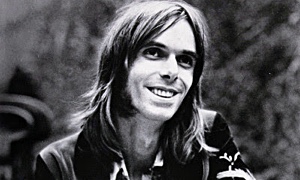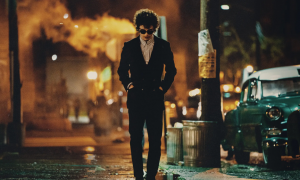Home » Jazz Articles » Film Review » Sylvie's Love
Sylvie's Love
 Sylvie's Love
Sylvie's Love Iam21 Entertainment/Seven Letter Word Films; distributed by Amazon Studios
Director: Eugene Ashe
Run Time: 114 minutes
2020
Sylvie's Love represents the new paradigm of film production. Produced by traditional film producers, and originally presented at the Sundance Film Festival, the film's main distribution has been online via Amazon's online video streaming service. It tells the story of star-crossed lovers Sylvie Parker (played by Tessa Thompson) and Robert Halloway (played by Nnamdi Asomugha). Sylvie and Robert first met during the summer of 1957 at the Harlem record store owned by Sylvie's father. Robert comes in looking for

Thelonious Monk
piano1917 - 1982
Sylvie is an aspiring TV director, and Robert is an aspiring jazz saxophonist. After Robert starts working at the record shop they find a lot in common, especially music. And Sylvie is drawn to him, despite the fact that she is engaged to a man serving in Korea in the military. Robert's band is taken under the wing of the Countess, a jazz patron and manager clearly modeled on the Baroness Pannonica de Koenigswarter (aka Nica, the bebop patron in whose apartment saxophonist

Charlie Parker
saxophone, alto1920 - 1955
Cut to five years later (Summer, 1962). Robert finishes a recording session and walks by Town Hall, where he bumps into Sylvie—repeating the scene that had opened the movie. She invites him to join her, as the jazz concert is about to start, and her girlfriend has not shown up. And so it begins anew... remember, star-crossed lovers. Sylvie's marriage is rocky, so it is emotionally believable that she would be open to reconnecting. Robert never seems to have any strong emotional ties to any other women, conveniently enough. But his professional life quickly gets upended. He leaves his band—relying upon the manager's earlier encouragement to let him know when he is ready to become a leader—only to be told that "jazz is dead."
An old Detroit friend promises an in at Motown Records, but when Robert goes to Detroit his friend admits that he was just bragging. He's really a minor assistant at the label, with no influence on hiring decisions. This sends the saxophonist into a tailspin. He tells Sylvie that he has no interest in being a family man (despite having gotten close to his son), and returns to Detroit alone, finding work in an automobile manufacturing factory. Robert's emotional meltdown is the most inexplicable act in the movie. It feels unearned, coming out of the blue to supply a final crisis for the couple to overcome. But overcome it they do, because Sylvie reaches out after hearing what Robert has really been doing in Detroit. All's well that ends well, as any romance film must.
The romance may be melodramatic, but it stays focused on the view from the Black community throughout, which is a rare thing (the recent film Ma Rainey's Black Bottom has the same sense of authenticity). This is a Black story told from a Black perspective, with only a few white characters in incidental roles. As mentioned previously, in a film with jazz music as a major theme it was important to get the details right—otherwise jazz fans would lose their suspension of disbelief. The filmmakers were accurate most of the time, but there were some small slips. During the 1957 scenes two prominent background songs were not released until 1958: "Tears On My Pillow" by Little Anthony and the Imperials, and Jackie Wilson's "To Be Loved." In the 1962 scenes Doris Day's version of "Fly Me To The Moon" is heard, which she did not record until 1965.
Compared to most period movies these are small chronological mistakes. But the "jazz is dead" career crisis seems premature for 1962. Motown was making hits, and the charts also had albums by folk acts like Joan Baez and Peter, Paul and Mary; pop/rock like Chubby Checker and Chuck Berry; and older pop like

Frank Sinatra
vocals1915 - 1998

Tony Bennett
vocals1926 - 2023

Dave Brubeck
piano1920 - 2012
In the end, Sylvie's Love is a period romance that beautifully captures two time periods in New York City, with a special focus on jazz performance. For jazz fans of a certain age an enjoyable time is almost guaranteed. But the film has charms that go beyond that, especially the powerful chemistry between the two leads.
Tags
Film Review
Thelonious Monk
Mark Sullivan
Dave Brubeck
Sylvie's Love
Amazon Studios
Detroit
Paris
New York City
Tessa Thompson
Nnamdi Asomugha
Comments
PREVIOUS / NEXT
Support All About Jazz
 All About Jazz has been a pillar of jazz since 1995, championing it as an art form and, more importantly, supporting the musicians who make it. Our enduring commitment has made "AAJ" one of the most culturally important websites of its kind, read by hundreds of thousands of fans, musicians and industry figures every month.
All About Jazz has been a pillar of jazz since 1995, championing it as an art form and, more importantly, supporting the musicians who make it. Our enduring commitment has made "AAJ" one of the most culturally important websites of its kind, read by hundreds of thousands of fans, musicians and industry figures every month.





 Buy Now
Buy Now























